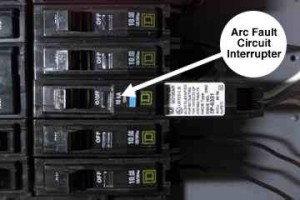You’ve heard of AFCIs, but what are they, and why should you care? AFCI stands for Arc-Fault Circuit Interrupters and they’re the unsung heroes in preventing electrical fires in your home.
Here’s a basic rundown of the need-to-knows. Take note, and take it to your local, licensed electrician to make sure your home is safe and up to code.
 They cut power. AFCI are designed for safety. They’re circuit breakers that cut off electricity when they sense danger. Specifically, when they sense an arc, or a dramatic spike in temperature that can happen when there’s an electrical short or ground fault. This puts wood and other materials at risk of igniting.
They cut power. AFCI are designed for safety. They’re circuit breakers that cut off electricity when they sense danger. Specifically, when they sense an arc, or a dramatic spike in temperature that can happen when there’s an electrical short or ground fault. This puts wood and other materials at risk of igniting.
- Maintenance. Unwanted electrical arcs = danger. They often occur in wires that are punctured, frayed or have deteriorated over time, like those found in older New England homes. This makes it more important than ever to have your electrical wiring inspected and maintained, and make AFCIs a priority.
- Avoid overloading your system. If your home’s electrical system is overloaded, you’re at greater risk for unwanted arcs and potential danger. We live in a world of devices and gadgets and must prepare our homes to handle that! Have your electrician ensure that you’re not overwhelming your electrical system. They can recommend the appropriate updates if your electrical needs have increased.
- Required by code. AFCIs are important in bringing your property up to electrical code. They used to be required in bedrooms only, but are now important for other living spaces, too. The National Electrical Code calls for ACFIs for all new properties, but they provide significant protection for existing properties, too.
- Test monthly. AFCIs should be installed by a licensed electrician, and tested every month or so using the “Test” button to make sure the device trips properly.
- Low cost. As important as they are for home safety, AFCIs will not break the bank; they cost about $30 per device.
Arcing faults cause nearly 30,000 home fires each year, and it’s estimated that AFCIs could prevent nearly half of them. So take the time to make electrical safety a priority . . . it can save you in the long run!
0 Likes

